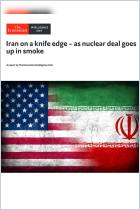Join getAbstract to access the summary!

Join getAbstract to access the summary!
Emma Ashford and John Glaser
Unforced Error
The Risks of Confrontation with Iran
Cato Institute, 2017
What's inside?
A hawkish approach toward Iran will likely backfire.
Recommendation
US President Donald Trump has made no secret of his confrontational attitude toward Iran and his hostility toward the Iran nuclear deal, which he touted as “the worst deal ever negotiated.” Besides criticizing some of the agreement's provisions, the Trump administration has also expressed strong concerns about the country’s long-range missile program and its support of terrorist groups and proxies across the Middle East. Yet if Trump wants to chart a more hawkish course on Iran, what are his options? Two foreign policy experts at the Cato Institute, a conservative US think tank, lay out the different approaches the United States could pursue and weigh their likely consequences.
Summary
About the Authors
John Glaser is director of foreign policy studies at the Cato Institute, where Emma Ashford is a research fellow.



















Comment on this summary